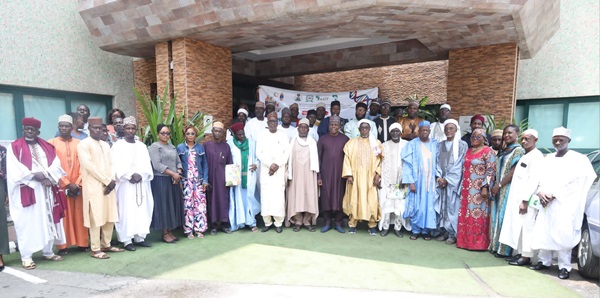
The Open Forum on Agricultural Biotechnology (OFAB) Nigeria, under the National Biotechnology Research and Development Agency (NBRDA), on Tuesday convened a sensitisation workshop in Abuja to engage Islamic clerics on the science, safety and benefits of genetically modified organisms (GMOs) and their products.
The workshop brought together members of the Islamic community from Abuja and its environs, aiming to bridge the gap between faith and science in the discourse on biotechnology. The director-general of NBRDA, Prof. Abdullahi Mustapha described the engagement as a strategic step toward fostering acceptance of GMOs, particularly within faith-based communities.
“Today’s gathering unites two vital pillars of our national life—faith and science. In a country where food insecurity and climate change remain critical challenges, we must explore every safe and effective technology to ensure the welfare of our people,” Mustapha stated.
He emphasised the ethical dimension of biotechnology, noting that religious voices carry immense influence within communities. “Islamic teachings emphasise consuming what is halal and tayyib – pure, wholesome and beneficial. Our shared responsibility is to ensure that any agricultural biotechnological product aligns with these principles, protecting life, health and dignity,” he added.
Speaking on behalf of the Islamic community, secretary to the Chief Imam of Dantata Mosque, Malam Abdullahi Nuhu expressed support for government-led biotechnology initiatives. “We offer our spiritual and moral backing for the responsible use of GMOs in agriculture. Our leaders have encouraged us to support these innovations wholeheartedly,” he said.
Director of the agricultural biotechnology department at NBRDA, Dr. Rose Gidado spoke on the role of biotechnology in building climate-resilient agriculture and promoting socio-economic development. “Biotechnology has significantly improved yields, enhanced food security and reduced crop losses. Nigeria’s biotechnology journey has reached a point where we must strengthen regulatory frameworks, secure sustainable funding and expand public acceptance,” she noted.
Principal investigator for the PBR Cowpea initiative, Prof. Ishiyaku Mohammed highlighted the scientific foundation of biotechnology in a presentation titled “Deploying Biotechnology Tools to Address Low Productivity Challenges Among Farmers.”
He explained that: “Biotechnology is grounded in science, which involves curiosity, observation and unbiased experimentation. Understanding the science helps demystify biotechnology and its benefits for agriculture.”
The director-general of the National Biosafety Management Agency (NBMA), Dr. Agnes Asagbra, represented by Dr. Josephine Adeogun, reassured participants of the agency’s regulatory vigilance. “NBMA ensures biosafety through a comprehensive regulatory framework. Our mandate is to guarantee the safe use of modern biotechnology in Nigeria,” she said.
In another presentation titled “Responsible Stewardship: Driving Long-Term Gains from GM Crops,” the pogramme officer for stewardship at the African Agricultural Technology Foundation (AATF), Dr. Ehirim Bernard underscored the importance of public education, regulatory compliance and transparent engagement. “Responsible stewardship, through continuous training, public outreach and strict adherence to regulations, is key to winning public trust and unlocking long-term benefits of GM technology,” Bernard stated.
The workshop marks an important step toward inclusive dialogue on biotechnology and reinforces the commitment of stakeholders to align scientific innovation with ethical and religious considerations in Nigeria.


